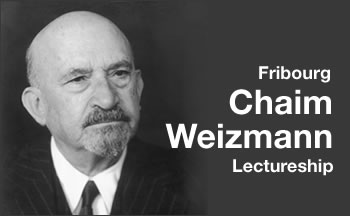Chaim Weizmann Lectures
Since 2009, Prof. Katharina Fromm is the organizer of the Chaim Weizmann Lectureships at the Chemistry Department.
For more information, visit the Chemistry Department site: (here); Agenda (here)

2021: Paul Nurse, Nobel Prize in Physiology or Medecine along with Leland Hartwell and Tim Hunt for their discoveries of protein molecules that control the division of cells in the cell cycle.
2020: Christer Kiselman, Mathematics Professor, University of Uppsala, Sweden,Member of the Royal Swedish Society of Sciences: “A life with Mathematics and Languages”.
2019: Randy Schekman, Nobel Prize in Physiology or Medecine along with James Rothman and Thomas C. Südhof for the Discoveries of machinery regulating vesicle traffic, a major transport system in our cells.
2018: Erwin Neher, Nobel Prize in Physiology or Medecine for the Discoveries concerning the function of single ion channels in cells.
2017: Felicitas Pauss for her outstanding work with particle physics at the high-energy frontier and astrophysics.
2016: Rolf Zinkernagel, Nobel Prize in Physiology or Medecine for his innovative work in the immune system and the recognition of virus-infected cells.
2015: Alan Heeger, Nobel Prize in Chemistry for his discovery and the development of conductive polymers. Besides the Nobel Prize in 2000, he won the Oliver E. Buckley Prize in 1983 and the Balzan Prize in 1995.
2014: Werner Arber, Nobel Prize in Physiology or Medecine along Hamilton Smith and Daniel Nathans for there pioneering research on epigenetics.
2013: Dan Shechtman, Nobel Prize in Chemistry for his outstanding discovery of quasicrystals. This discovery revolutionized the definition of the word “crystal”.
2012: Carl Djerassi for his pioneering work in the development of the oral contraceptive pills, which enormously influenced our society.
2010: Jean-Marie Lehn, Nobel Prize in Chemistry for his ground-breaking and still on-going developments in theconcepts of supramolecular chemistry.
2009: Ada E. Yonath, Nobel Prize in Chemistry for her outstanding contributions in the elucidation of the structure and reactivity of the ribosome by initiating ribosomal crystallography. In addition, she has some parallels with the scientific career of Chaim Weizmann.
BIOGRAPHY OF CHAIM WEIZMANN
Chaim Weizmann was born in the small village of Motol (Motyli, now Motal’) near Pinsk in Belarus (at that time part of the Russian Empire). After Cheder and Gymnasium, Weizmann started to study chemistry in Darmstadt at the Technischen Hochschule in 1892, and from 1894 on at the Royal Technical Hochschule in Berlin. In 1897, Weizmann moved to Fribourg in Switzerland where he received his PhD in chemistry in 1899 with summa cum laude. He then lectured in chemistry at the University of Geneva between 1901 and 1903.
He became a British subject in 1910, and, while a lecturer at Manchester, he became famous for discovering how to use bacterial fermentation to produce large quantities of relevant substances. He is considered to be the father of industrial fermentation. He used the bacterium Clostridium acetobutylicum (the Weizmann organism) to produce acetone. Acetone was used in the manufacture of cordite explosive propellants critical to the Allied war effort. Weizmann transferred the rights to the manufacture of acetone to the Commercial Solvents Corporation in exchange for royalties. After the Shell Crisis of 1915 during World War I, he was director of the British Admiralty laboratories from 1916 until 1919. During World War II, he was an honorary adviser to the British Ministry of Supply and did research on synthetic rubber and high-octane gasoline.
Already since 1918, Weizmann was engaged, together with Albert Einstein and Hugo Bergman in the foundation of the Hebrew University of Jerusalem, the president of which he became from 1932 until 1952. Living in Rechowot, he founded a research institution, which became famous as today’s WeizmannInstitute. Chaim Weizmann died on November 9th, 1952 and was buried in the garden of his house which is today part of the Weizmann-Institute.